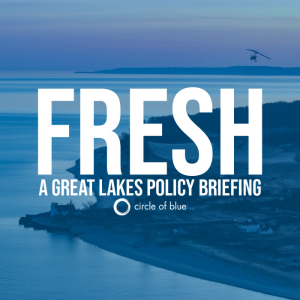Federal Water Tap, March 6: EPA Issues Cybersecurity Order for Water Utilities
The Rundown
- EPA orders water utilities to detail cybersecurity plans.
- Upper Colorado River states want Reclamation to halt releases of extra water into Lake Powell.
- The EPA details funding for disadvantaged communities to address emerging contaminants like PFAS.
- Congress kicks into gear with hearings on wildfire, train derailment, cryptocurrency mining, and flood insurance.
And lastly, the EPA administrator visits the site of a train derailment in eastern Ohio.
“I am the father of a 9-year-old. I think we have to all agree that we all wish this accident did not occur. But the accident occurred and as a result some of our creeks and streams have pollution in them. We are working very hard to clean up that pollution but for the time being, as long as the pollution is present, as a father I would not advise anyone to play in the creeks and streams. What we have said is that the drinking water has been tested and if it has been tested and a green light has been given, we feel confident in that.” — Michael Regan, the EPA administrator, during a visit to the site of a Norfolk Southern train derailment in East Palestine, Ohio.
By the Numbers
$2 Billion: Infrastructure law funding made available to small, rural, and disadvantaged communities to remove emerging contaminants from drinking water.
News Briefs
Cybersecurity Requirements
The U.S Environmental Protection Agency ordered water utilities to report on their plans to prevent hackers from disrupting their operations.
In a memorandum, the agency instructed states to evaluate utilities’ cybersecurity practices as part of regular “sanitary surveys” that the utilities are already required to complete.
The EPA’s memo comes the same week as the White House released a national cybersecurity strategy. The strategy notes the administration’s willingness to use “existing authorities” to regulate critical sectors like water and energy.
By mandating assessments, the agency hopes to decrease the likelihood of an attack and, in the event, shorten response and recovery times. A companion guidance document gives direction to state officials who will be leading the process.
Water sector groups, though supportive of more diligent cyber-hygiene, did not want the mandate as part of the sanitary surveys.
House Committee Targets Permitting
The House Transportation and Infrastructure Committee passed two items that would reduce federal government oversight over water resources.
One is a resolution seeking to invalidate the Biden administration’s definition of water bodies that are protected by the Clean Water Law. The mechanism for invalidation is the Congressional Review Act. For that to happen, the Democratic majority in the Senate would also have to agree.
The other item is a bill to narrow the focus of state reviews of infrastructure projects. The bill takes aim at Section 401 of the Clean Water Act, which has been a source of conflict in recent years over permitting fossil fuel projects.
Water Quality Standards for Meat and Poultry Producers
A draft agreement between the EPA and environmental groups would set a timeline for the agency to develop water quality discharge standards for meat and poultry producers.
Under the proposal, the EPA would have a deadline of August 31, 2025 to finalize the standards.
Studies and Reports
Colorado River Reservoir Correction?
Stop the releases, the four states of the upper Colorado River basin say.
Colorado, New Mexico, Utah, and Wyoming petitioned the Bureau of Reclamation to halt releases of extra water from reservoirs in the upper reaches of the Colorado River watershed. The releases began last year to boost water levels in the beleaguered Lake Powell, located downstream.
The Upper Colorado River Commission is requesting that the releases end two months early, some 39,000 acre-feet short of the planned 500,000 acre-feet.
The commission’s argument is that winter storms have boosted snowpack and raised Powell’s projected elevation. You can’t put toothpaste back in the tube, and once water is released downstream there’s no way to return it.
Army Corps 2023 Spending Plan
The Army Corps released its plan for spending federal appropriations in 2023.
That includes $8.3 billion in general funding and $1.48 billion in supplementary disaster assistance, in response to events like Hurricane Ian, which wrecked the Florida coast.
On the Radar
Biden Budget
President Biden is expected to release his fiscal year 2024 budget proposal on March 9.
Congressional Hearings
On March 7, a Senate Environment and Public Works subcommittee will discuss the environmental impacts of cryptocurrency mining.
On March 8, a House Natural Resources subcommittee will hold a hearing on the “multiple use” of water resources.
On March 8, the Senate Budget Committee will learn about the economic impacts of wildfire.
On March 9, the Senate Environment and Public Works Committee will hear from local, state, and federal officials about the environmental impacts of the train derailment in Ohio.
On March 10, a House Financial Services subcommittee discusses flood insurance.
Hexavalent Chromium Review
An EPA Science Advisory Board panel will hold public meetings on March 29-31 to discuss the agency’s toxicological review of hexavalent chromium.
Dial-in information is in the link.
Federal Water Tap is a weekly digest spotting trends in U.S. government water policy. To get more water news, follow Circle of Blue on Twitter and sign up for our newsletter.
Brett writes about agriculture, energy, infrastructure, and the politics and economics of water in the United States. He also writes the Federal Water Tap, Circle of Blue’s weekly digest of U.S. government water news. He is the winner of two Society of Environmental Journalists reporting awards, one of the top honors in American environmental journalism: first place for explanatory reporting for a series on septic system pollution in the United States(2016) and third place for beat reporting in a small market (2014). He received the Sierra Club’s Distinguished Service Award in 2018. Brett lives in Seattle, where he hikes the mountains and bakes pies. Contact Brett Walton






Leave a Reply
Want to join the discussion?Feel free to contribute!